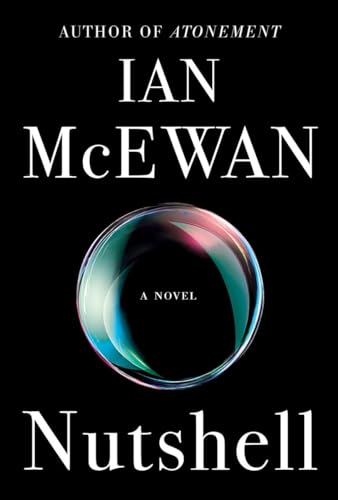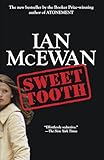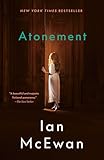
1.
A few months ago, like the dull thuds of a heart beginning to beat, I heard the first stirrings of Ian McEwan’s new novel as publicists and publishers began preparing its delivery into the world. Interviews appeared, an atmospheric trailer that revealed absolutely nothing was released on McEwan’s Facebook page, a blurb was posted on his publisher’s website. By then we had a short description, and we knew that there was something a little special about this one: the novel would be narrated by a fetus.
The novel’s first line sets the tone: “So here I am, upside down in a woman.” Now that’s what I call first-person limited. As for plot, it’s straightforward enough, “the classic tale of murder and deceit” we were promised in the blurb: pregnant Trudy has taken on a lover, Claude. Together, they plan to murder Trudy’s husband, John, who is also Claude’s brother. The motive? Money, of course, in the form of the marital home, a “Georgian pile on boastful Hamilton Terrace” whose “six thousand aching square feet will buy you seven million pounds,” even in its dilapidated state.
Our unborn narrator, privy to these murderous musings, begins by discussing the abstractions he has to dwell on since he has yet to see anything, although it’s soon clear that he’s awfully well informed about things like the U.S. constitution, climate change, and contemporary world politics for someone who hasn’t taken his first breath yet. He (and we know from the “shrimp-like protuberance” between his legs that he is a he) soon explains that he’s learned most of these things by listening to the podcasts his mother plays at night when she can’t sleep. Our narrator has pretentious tastes: an audiobook of James Joyce’s Ulysses “thrills” him, but sends his mother to sleep.
 He also knows a lot about wine, which he is apparently able to taste even though it is “decanted through a healthy placenta.” McEwan enjoys peppering his novels with mouth-watering descriptions of food and drink (I often dream of the seafood stew in Saturday), and he hasn’t found a reason not to do so, quite elaborately, even from this undeveloped perspective. A Pouilly-Fumé taken in a moment of high emotional intensity is “too thin, too piercing,” while an earlier Pinot Noir is “a mother’s soothing hand” whose “hint of violets and fine tannins suggests that lazy, clement summer of 2005, untainted by heatwaves though a teasing, next-room aroma of mocha, as well as more proximal black-skinned banana, summon Jean Grivot’s domaine in 2009.”
He also knows a lot about wine, which he is apparently able to taste even though it is “decanted through a healthy placenta.” McEwan enjoys peppering his novels with mouth-watering descriptions of food and drink (I often dream of the seafood stew in Saturday), and he hasn’t found a reason not to do so, quite elaborately, even from this undeveloped perspective. A Pouilly-Fumé taken in a moment of high emotional intensity is “too thin, too piercing,” while an earlier Pinot Noir is “a mother’s soothing hand” whose “hint of violets and fine tannins suggests that lazy, clement summer of 2005, untainted by heatwaves though a teasing, next-room aroma of mocha, as well as more proximal black-skinned banana, summon Jean Grivot’s domaine in 2009.”
This unborn baby knows his grapes, and a lot more besides.
2.


 Much of McEwan’s work can be understood as a knotted tension between realism and — what, exactly? Let’s call it falsehood. Atonement and Sweet Tooth both pulled the narrative rug from beneath the reader’s feet, tipping the story into meta-fiction. Personally, I was delighted by McEwan’s bravura — by the clean, clever way the narrative coiled back upon itself — but I know readers who are unimpressed by such tricks. Solar and Amsterdam, while not entirely unpleasant, offered little depth in their leap towards satire. The Children Act bored me with its clunky symbolism and Dickensian social commentary. As Tessa Hadley put it in her review of that novel, “[r]ealism seems beside the point after a while: it’s more like being inside the workings of an allegory or a parable.”
Much of McEwan’s work can be understood as a knotted tension between realism and — what, exactly? Let’s call it falsehood. Atonement and Sweet Tooth both pulled the narrative rug from beneath the reader’s feet, tipping the story into meta-fiction. Personally, I was delighted by McEwan’s bravura — by the clean, clever way the narrative coiled back upon itself — but I know readers who are unimpressed by such tricks. Solar and Amsterdam, while not entirely unpleasant, offered little depth in their leap towards satire. The Children Act bored me with its clunky symbolism and Dickensian social commentary. As Tessa Hadley put it in her review of that novel, “[r]ealism seems beside the point after a while: it’s more like being inside the workings of an allegory or a parable.”
But at a sentence-level, McEwan’s work remains that of an old-fashioned realist. In a lecture he gave at Harvard University in 2012, he stated that one of the novel’s supreme virtues was “the air of reality, the solidicity [sic].” In the same lecture, McEwan stated: “I have refused to give my character wings.”
Now, with Nutshell, McEwan has nudged his hallowed realism onto unsteady ground. Although the story itself is realistic enough, and steeped in McEwan’s usual attention to detail, the voice that tells it to us is, in a way, complete fantasy. The novel might as well be told from within the consciousness of a dog, a ghost, or a piece of furniture.
The wine tasting, which I described above, is part of the problem, but so are the metaphors. Our narrator feels the sound of a cork drawn from a Jean-Max Roger Sancerre “like the caress of a summer breeze,” “innocent toes” are imagined lined up “like children in a family photo,” his first headache is “a gaudy bandana,” a moment of silence is “creamily thick” while at another moment something “hangs in the air, like a Beijing smog.” Some of these comparisons are quite good, although most are barren of the thematic resonance that would make them great. Sometimes the writing strains and groans with the pressure of its own self-conscious preciosity, as when the narrator pictures his mother “youngly slumped” on a table and then tells us he “insist[s] on the adverb,” which means that McEwan does. You can almost see him penciling that in for his editor.
More importantly, the metaphors don’t make sense because our narrator has never experienced or seen any of the vehicles he uses, just as he’s never seen a table or knows what it is to slump. And I refuse to believe he picked all that up from podcasts. Any realism in this novel is undermined by the simple fact that a fetus can’t know what this fetus knows. An unborn baby can’t differentiate between an Échézeaux Grand Cru and a Romanée-Conti from the snugness of the womb, an unborn baby can’t “picture a hayloft, off which a hundred-kilo sacks of grain is tossed to the granary floor” and compare that image to the sound of his mother’s beating heart. It is not improbable, like some plot points of other McEwan novels; it is impossible.
3.
I’m doing what I shouldn’t do, which is to dissect the basic realism of the novel’s conceit. In Sweet Tooth McEwan gave us a constructed narrator, a fiction, who is a voracious reader of realist fiction — Serena Frome likes novels that mention real events, real people, and real places. Like McEwan himself, who was thrilled in his youth to find a reference in a novel he was reading to a real illustration from Punch that he was able to look up, Frome reads to see fact collapse within fiction.
The in-utero narrator of Nutshell is, by comparison, a dreamer. At one point in the story, drunk on the bottle of Sauvignon Blanc his mother has imbibed on her own (or, as it were, in his company), he spreads his imaginative wings and visualizes for us the conversation occurring at that moment between his father and his uncle. Upon returning to the womb, he writes, “One could make a living devising such excursions,” which is of course exactly what McEwan has done as a novelist.
So perhaps we have here an indication that the author has given up on his obsession with the real, that he has come to terms with the fact that he writes about characters and events that are not factual. He has dealt with the question: if none of this is real, then why go to such lengths to make sure that it appears to be?
The moment of fiction doesn’t last, though. In the next line, the narrator thinks, “But the actual, the circumscribed real, is absorbing too and I’m impatient for Claude to return and us what really happened.” Old habits are hard to kill.
Still, it looks like McEwan, this once at least, has decided to shuffle off the mortal coil of realism in favor of an impossible point of view. I applaud his new purpose because the payoffs are worth it. For all its un-believability, Nutshell’s narrator offers us interesting moments, and gives McEwan the chance to show off some fresh writing. Particularly good are scenes of high emotion described from within Trudy’s anatomy. McEwan replaces the smiles, blushes, glances, and head movements that are the fiction writer’s traditional arsenal of “telling” descriptors with even more telling organ movements. A moment of hesitation in a conversation is rich with unspoken feeling: “my mother’s heart begins a steady acceleration. Not just faster, but louder, like the hollow knocking sound of faulty plumbing. Something is also happening in her gut. Her bowels are loosening, with a squeaky stretching sound, and higher up, somewhere above my feet, juices race down winding tubes to unknown destinations.” The body doesn’t lie.
Likewise, sex between the murderous lovers becomes a particularly disturbing turbulence when described from within. The pressure of a penis penetrating near our narrator’s skull, swallowed sperm being converted into nutrients, these are small horrors that seem at times more criminal than the murder at hand.
4.
Another interesting aspect of the book is the narrator’s unequivocal love for his mother, a love that remains troubled but true over the course of the novel, despite her desire to kill the father who has all the fetus’s sympathy. Here McEwan is using William Shakespeare as his touchstone. The book’s epigraph is from Hamlet, and the novel recycles some of the Danish play’s basic story elements, with our narrator as an unborn Hamlet.
As in Hamlet, there is poison, although not administered in the ear, and while the cuckolded father is plain John, his brother and rival lover has the unusual name of Claude, too close to Claudius not to be a wink. Another allusion: once their dark deed is done, McEwan has Claude and Trudy order Danish take-away (“open sandwiches, pickled herring, baked meats,” maybe from Snaps & Rye in nearby Notting Hill?).
And in the role of Gertrude, we have Trudy. The Queen of Denmark fascinates because it’s hard to know how duplicitous she is. Hamlet’s attitude towards her shifts between pity, hatred, resentment, and affection. While Nutshell’s narrator disapproves of his mother’s actions, his blame and anger are always directed at his uncle, and in his fantasies he saves her from him. Like Gertrude, Trudy never comes off as the villain, and our young hero seeks revenge on his uncle alone.
For all her motherly defects Trudy remains something of an enigma in the book, a half-realized character. John is the poet — hopeful, naïve, generous — and Claude the over-eager younger brother, slimy almost to the point of caricature. But what about Trudy? An early story about a dead cat and a late reference to her mother do little to give us a better of understanding of who she is. She’s beautiful, we know that. And smarter than Claude. And unlike him she feels uncertainty, remorse, and regret. But what does she like? What does she want? She has no friends, no family. No job and no interests, other than drinking — and even there she seems less knowing than Claude and her unborn child. She doesn’t leave the house for the duration of the novel.
Maybe that’s the point. To our narrator she is the mother, and he doesn’t want her to be anything more or less. The house she doesn’t leave is akin to the womb her unborn son can’t leave, until he can. Near the end of Nutshell, when the narrator has grown almost too big for the womb, he says, “I wear my mother like a tight-fitting cap.” It’s no longer she who bears him, but he who wears her.
5.
My questions about McEwan’s devotion to realism seek to prod the aesthetic motivations behind his new novel. Realist or not, though, McEwan’s abilities as a fiction writer are undeniable. In Nutshell especially he demonstrates his skill with pacing. He ends each chapter with a satisfying morsel that moves things along. The murder plot remains taut throughout and, thanks to a certain owl poet who probably isn’t what she seems, not altogether as straightforward as the reader might first assume. The climax delivers the right amount of action and the dénouement settles things in a satisfying way thanks to the agency of our narrator.
There remains only to see if McEwan will follow this new path and continue to explore the chaos of invention, or if he will return to the comforting order of fact.








